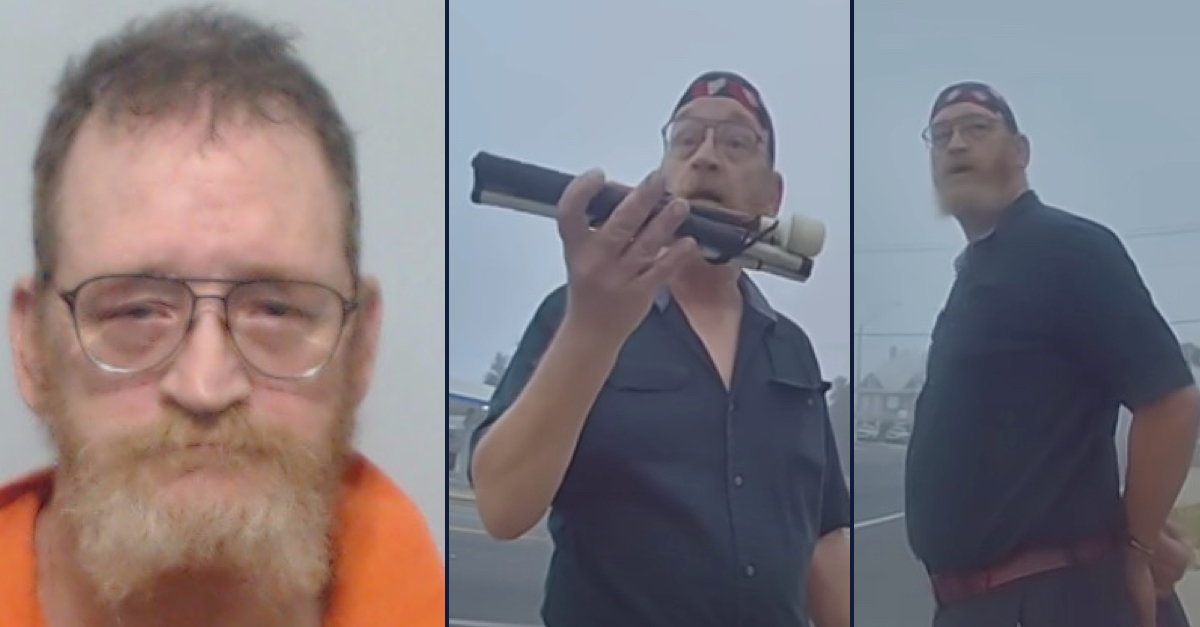James Hodges Lawsuit: Cane Mistaken For Gun - Updates & Legal Battle
Can a simple misunderstanding lead to a violation of rights and a fight for justice? The case of James Hodges, a legally blind man arrested in Columbia County, Florida, highlights the potential for systemic failures within law enforcement and the importance of holding those in authority accountable.
In the heart of Lake City, Florida, a story unfolded that has ignited discussions about police conduct, the rights of individuals with disabilities, and the pursuit of justice. On October 31, 2022, James Hodges, a 61-year-old legally blind man, found himself at the center of an unsettling incident. As he made his way home from jury duty, a deputy of the Columbia County Sheriff's Office stopped him, concerned by an object in his back pocket. The object, a folded walking cane, was mistaken for a weapon, leading to Hodges' arrest. This event, captured on body camera footage, has since sparked outrage and prompted a lawsuit against the Sheriff's Office, bringing a spotlight to the intricacies of law enforcement and the challenges faced by those with disabilities.
| Attribute | Details |
|---|---|
| Full Name | James Hodges |
| Age (as of incident) | 61 years old |
| Location | Lake City, Columbia County, Florida |
| Disability | Legally Blind (Blind since 1995 due to a random act of violence) |
| Incident Date | October 31, 2022 |
| Arresting Officer | Deputy Jayme Gohde |
| Charges | Resisting an Officer Without Violence (later dropped) |
| Lawsuit | Filed a federal lawsuit against the Sheriff's Office, alleging excessive force, inadequate investigation, and malicious prosecution. |
| Incident Type | Wrongful arrest due to misidentification of a walking cane as a weapon |
| Legal Representation | Information Not Available in provided content |
| Outcome | Charges were dropped after scrutiny. The lawsuit was dismissed in 2024. |
| Reference Website | First Coast News (For reference purposes - specific details can vary) |
The events of that day, as documented in body camera footage, paint a clear picture of the encounter. Deputy Jayme Gohde, concerned by what she perceived as a weapon, stopped Hodges. Despite his explanation and the demonstration of his foldable cane, the situation escalated, leading to his arrest. The charges, however, were eventually dropped, a reflection of the scrutiny the incident attracted.
Following the arrest, Hodges did not remain silent. He filed a formal complaint and, with the support of his legal team, initiated a lawsuit against the Columbia County Sheriff's Office. The lawsuit claimed not only wrongful arrest but also alleged excessive force, inadequate investigation, and malicious prosecution. Hodges' attorneys argued that the incident was not an isolated occurrence but rather the result of deeper systemic failures within the department. The case has become a focal point, drawing attention to departmental policies and the training officers receive, especially in interactions with individuals with disabilities.
The body camera footage, widely circulated online, has played a crucial role in shaping public perception. The video shows the exchange between Hodges and the officers, clearly illustrating the point of misunderstanding and the subsequent escalation. It also captured Hodges' clear communication of his legal blindness and his use of a walking cane for mobility. The widespread sharing of this footage on social media platforms has fueled public outrage and calls for accountability.
The response from the Columbia County Sheriff's Office has been multifaceted. Initially, Sheriff Mark Hunter stated that the deputies involved violated department policies. Both Deputy Gohde and her supervisor were suspended, and the deputies were slated for additional training, including civil rights training. The Sheriff's office also confirmed the authenticity of the body camera footage and acknowledged the seriousness of the situation. However, the subsequent dismissal of Hodges' lawsuit in 2024 suggests that the legal system did not find enough evidence to support his claims, despite the public outcry.
The crux of the issue lies in the intersection of law enforcement and the challenges faced by individuals with disabilities. In this case, the deputys misidentification of the cane as a weapon triggered the chain of events. The incident highlights the crucial need for sensitivity training and clear policies within police departments, particularly in their interactions with people who have disabilities. Without such measures, misunderstandings can quickly escalate, leading to unjust arrests and the erosion of public trust.
The case of James Hodges serves as a reminder that the actions of law enforcement officers can have profound and lasting consequences. It emphasizes the importance of holding those in power accountable and the need for systemic reform. The incident prompts a broader discussion regarding the training and oversight of law enforcement, the treatment of individuals with disabilities, and the potential for misuse of power.
The legal battle faced by Hodges and his team brings up the issue of how these incidents are handled within the justice system. If a plaintiff wins a lawsuit, the costs are paid through tax dollars. When a law enforcement officer is suspended, they might remain on paid leave. If they are fired, they can sometimes move to another county and find employment there. This cycle calls for a thorough examination of police accountability systems and their effectiveness.
The impact of the incident has gone beyond the immediate legal ramifications. The case has fueled discussions about the importance of community engagement and the role of media in holding law enforcement accountable. The outpouring of support for Hodges reflects a growing awareness of the rights of individuals and the need for a more just and equitable society.
The video of the arrest of Hodges captured a moment of potential misjudgment by the deputy, and his efforts to explain the circumstances, leading to his arrest. As Hodges mentioned in the footage, he was exercising his right to walk home from jury duty when he was stopped. The fact that he was carrying a cane was used against him. This is an essential point that could lead to broader reflection on the interactions between law enforcement and the legally blind.
The outcome of the lawsuit, although it resulted in the dismissal of the case, does not diminish the importance of the incident. It underscores the necessity of comprehensive training for law enforcement officers, ensuring that they are equipped with the knowledge and skills to interact with individuals with disabilities. It also calls for a review of departmental policies and procedures to prevent similar incidents from occurring in the future. The arrest of James Hodges has sparked a conversation about justice, disability rights, and law enforcement's accountability in the state of Florida.
In light of the incident, there is a broader call for increased transparency and accountability within law enforcement agencies. The distribution of body camera footage has increased the public's ability to scrutinize police behavior and has brought forth an awareness of the interactions between officers and people with disabilities. This has led to a growing demand for body camera usage and more readily available video footage to give the public a view into interactions between law enforcement and members of the public.
This event also speaks to the need for ongoing community dialogue and education. It is essential to educate the public about the rights of individuals with disabilities and how to interact with them respectfully. The case offers an opportunity for collaboration between law enforcement agencies, disability rights advocates, and community members, paving the path for a more understanding and inclusive society. The hope is that in the aftermath of this case, Lake City and Columbia County will become a safer and more equitable place for all, a place where the law protects and serves all citizens.
Hodges, a legally blind veteran, found himself wrongfully accused. After his arrest, Hodges lawyer immediately filed intent to sue the sheriff's office. He further explained that the incident was not an isolated occurrence. He alleged that it was the product of systematic failures within the Columbia County Sheriff's Office. In the end, Hodges' fight brought the community together, to fight for justice for the legally blind veteran, but the question of whether the justice system fully delivered on that pursuit remains.



Detail Author:
- Name : Prof. Janae Emard
- Email : jcrona@hotmail.com
- Birthdate : 1985-11-06
- Address : 8421 Runte Turnpike North Nicolaville, CT 91588
- Phone : 580.367.6209
- Company : Wiegand Group
- Job : Desktop Publisher
- Bio : Sed doloremque tempore repellat quos. Optio labore quisquam in rerum voluptatum quo voluptate quaerat.